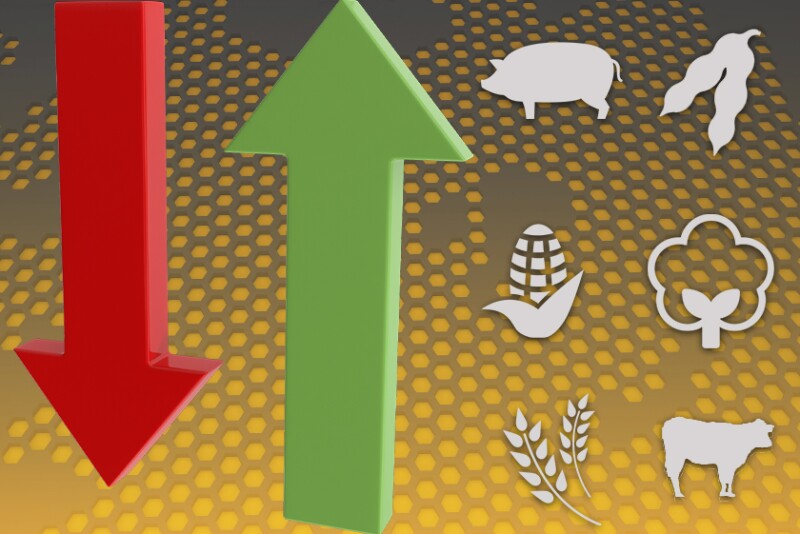GRAIN CALLS
Corn: 4 to 6 cents lower.
Soybeans: Steady to 3 cents higher.
Wheat: 9 to 17 cents lower.
GENERAL COMMENTS: Corn futures fell to a six-month low overnight on expectations that rain and cooler temperatures in the Midwest will ease crop stress. Wheat futures fell following reports of a deal to resume Ukrainian grain shipments. Soybeans ended firmer overnight after earlier trading lower. Malaysian palm oil futures fell 0.5% but still ended with a 3.1% weekly gain. Front-month crude oil futures are slightly lower. U.S. stock indexes signal a weaker open and the U.S. dollar index is down slightly.
Showers and milder weather are expected over much of the U.S. northern Plains and Midwest next week and into the first days of August, World Weather Inc. said. “The weather change will be welcome and good for crop development,” the forecaster said.
Ukraine, Russia, Turkey and UN Secretary-General Antonio Guterres reportedly will sign a deal at 8:30 a.m. CT to resume Ukraine’s Black Sea grain exports. Under the terms of the deal, Ukraine will escort ships through mined waters to reach its ports, while Russia has agreed not to target vessels involved in grain shipment. As a confidence measure, Turkish officials have agreed to inspect the ships to allay any smuggling concerns. Removing the underwater minefields that protect the ports Kyiv still controls may expose them to attack. Bloomberg notes there is also the question of “why Russia would relinquish a major point of leverage as it pushes to annex more Ukrainian territory, since it’s unlikely to win its demand that economic sanctions ease.”
Indonesia is considering removing a domestic sales requirement for firms to obtain palm oil export permits because high inventories have been holding back a recovery of palm oil fruit prices, the country’s trade minister said. Policies to address the glut of palm oil inventories including a temporary removal of an export levy and a larger export quota, had failed to slash stocks quickly.
China will auction another 500,000 MT of imported soybeans from its state reserves on July 29. Beijing continues to sell state-owned soybeans into the domestic market via weekly auctions to ensure plentiful supplies.
Viral fragments of food-and-mouth disease were found in a sample of pork floss offered for sale in Melbourne. Authorities have ramped up surveillance to prevent an incursion and are set to deploy sanitation foot mats at international airports. A widespread outbreak could hurt global beef supplies as Australia comprises 13% of world trade.
France’s grain harvest kept up at a fast pace in the week to July 18, with soft wheat running two weeks ahead of last year, while maize crop conditions deteriorated as the country experienced a hot spell, FranceAgriMer data showed today. The farm office said in French farmers had harvested 84% of the soft wheat crop by July 18, up from 50% last week and 12% by the same time in 2021.
South Korea purchased 128,000 MT of corn expected to be sourced from South America or South Africa and 65,000 MT of optional origin corn.
Buyers from China purchased large volumes of Australian and French wheat this week in a sign that the Asian country is taking advantage of a recent dip in prices to fill its large needs, European traders said. Traders reported purchases of around 1 MMT of Australian wheat, both for animal feed and flour milling. In addition, China bought at least two cargoes, possibly up to seven, of French wheat this week.
CORN: December corn overnight fell as low as $5.63 1/2, the contract’s lowest intraday price since $5.57 1/4 on Jan. 24 and down from $6.03 3/4 at the end of last week.
SOYBEANS: November soybeans also fell to a six-month low overnight, dropping to $12.88 1/2, before recovering to slight gains. The new-crop contract is still down from $13.42 1/4 at the end of last week.
WHEAT: September SRW wheat fell as low as $7.75 1/4 overnight and is down slightly from the end of last week, when the contract closed at $7.76 3/4.
LIVESTOCK CALLS
CATTLE: Steady-mixed
HOGS: Steady-firmer
CATTLE: Live cattle futures may face pressure from slipping cash values. Packer demand for cash cattle has been limited so far this week, as they are seemingly content to pull from committed supplies. Feedlots have been keeping current and also haven’t been in a rush to sell cattle at lower prices. USDA-reported live steers averaged $140.40 through Thursday morning, down from last week’s average of $142.12. Trade today maybe subdued as the market waits for Cattle on Feed and Cattle Inventory data.
USDA’s Cattle on Feed Report this afternoon is expected to show the July 1 feedlot inventory up 0.1% from year-ago levels, with June placements expected to have declined 5% and marketings to have risen 1.9%. USDA’s Cattle Inventory Report is expected to show U.S. cattle herd as of July 1 down 2.1% from year-ago. The projected 2022 calf crop is expected to have shrunk another 2%. Beef heifers held back for breeding are expected to be down 3.2% from last year.
HOGS: Lean hog futures may extend this week’s rally to three-month highs on cash strength, but could face profit-taking pressure ahead of the weekend. The CME lean hog index is up another 67 cents to $117.04 (as of July 20), which should keep front-month August lean hog futures supported. Deferred lean hog futures weakened Thursday on a corrective pullback but any price pressure should be limited as October hogs already hold more than double the normal seasonal decline from now until mid-October. Pork cutout values fell 47 cents Thursday to $123.90 on relatively light movement of 276 loads.
USDA’s Cold Storage Report this afternoon will detail frozen meat stocks at the end of June. The five-year average is a 3-million-lb. decline in beef stocks and a 25.8-million-lb. drop in pork stocks during the month.

